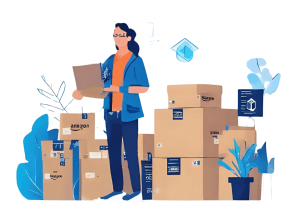Ed. Note: This post is part of our Sales Tax 101 series, created with help from our friends at TaxJar.
The Basics of Sales Tax Nexus
Online sellers must collect sales tax in states or localities where they have “sales tax nexus.”
While all states have a slightly different definition of this term, sales tax nexus is generally defined as “presence” in a state that’s significant enough so that a business has to comply with the state’s sales tax law.
Presence can include – but is not limited to – an office, an employee or inventory in a warehouse.
If you have sales tax nexus in a state that requires sales tax collection, then you’re required to collect sales tax from all buyers in that state regardless from where the item is shipped.
If you do not have sales tax nexus in a state, then you’re not required to collect sales tax when you sell online to buyers in that state (regardless from where the item is shipped).
Keep reading to learn more.
3 Common Examples of Sales Tax Nexus
Home State Nexus
You live and run your eCommerce business in Texas. Because you have a physical presence in Texas, you have “sales tax nexus” there, and therefore are required to collect sales tax from buyers in the state of Texas.
Employee Nexus
You live and run your eCommerce business in the state of Florida, but you hire your sister in Georgia to help you. Because you operate out of Florida and have an employee in Georgia, you now have sales tax nexus in Florida and Georgia and must collect sales tax from buyers in both states.
Inventory Nexus
Most states have ruled – either definitively or vaguely – that 3rd party fulfillment constitutes nexus. This means that if you store your inventory in a warehouse in a state, then that constitutes sales tax nexus. So if you live in Wisconsin, but store your inventory in California for the purposes of faster shipping, then you have sales tax nexus in both states.
The Difficulty of Inventory-Based Nexus
Inventory-based nexus can be especially cumbersome for 3rd-party Amazon sellers, whose inventory may be stored in states other than their home state.
Third-party selling, and the associated sales tax registration and filings required, can create a huge administrative burden on unsuspecting eCommerce merchants.
Once you’ve determined where you have sales tax nexus, you’re required to do two things:
- Obtain a sales tax permit (sometimes called sales tax license) for that state (in the cases of third-party sellers this means acquire a license in every state where you warehouse inventory).
- Begin collecting sales tax in that state (most states consider it illegal to collect sales tax without a permit).
And that’s what we’ll be talking about next week, obtaining sales tax permits and collecting sales tax.




